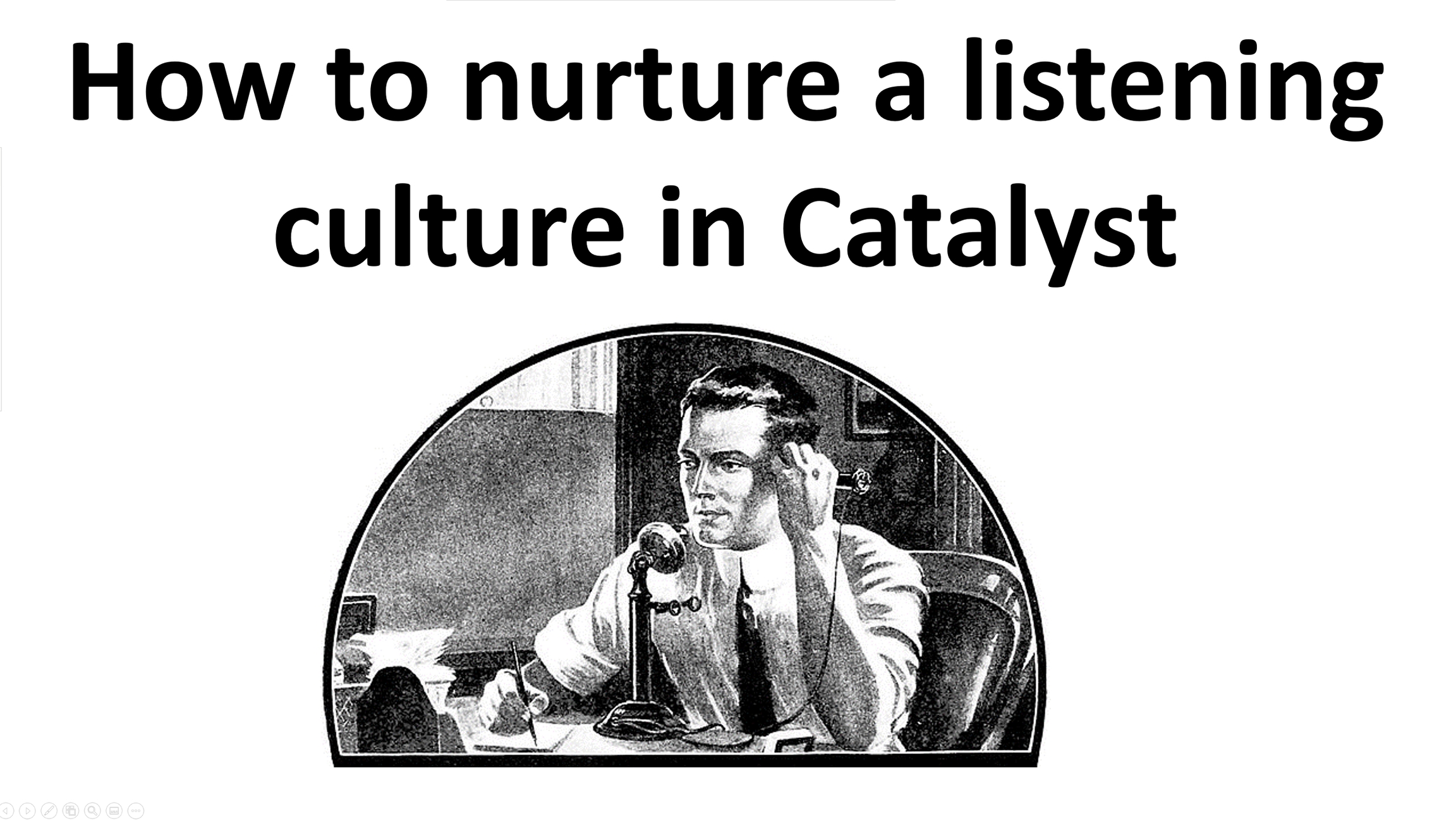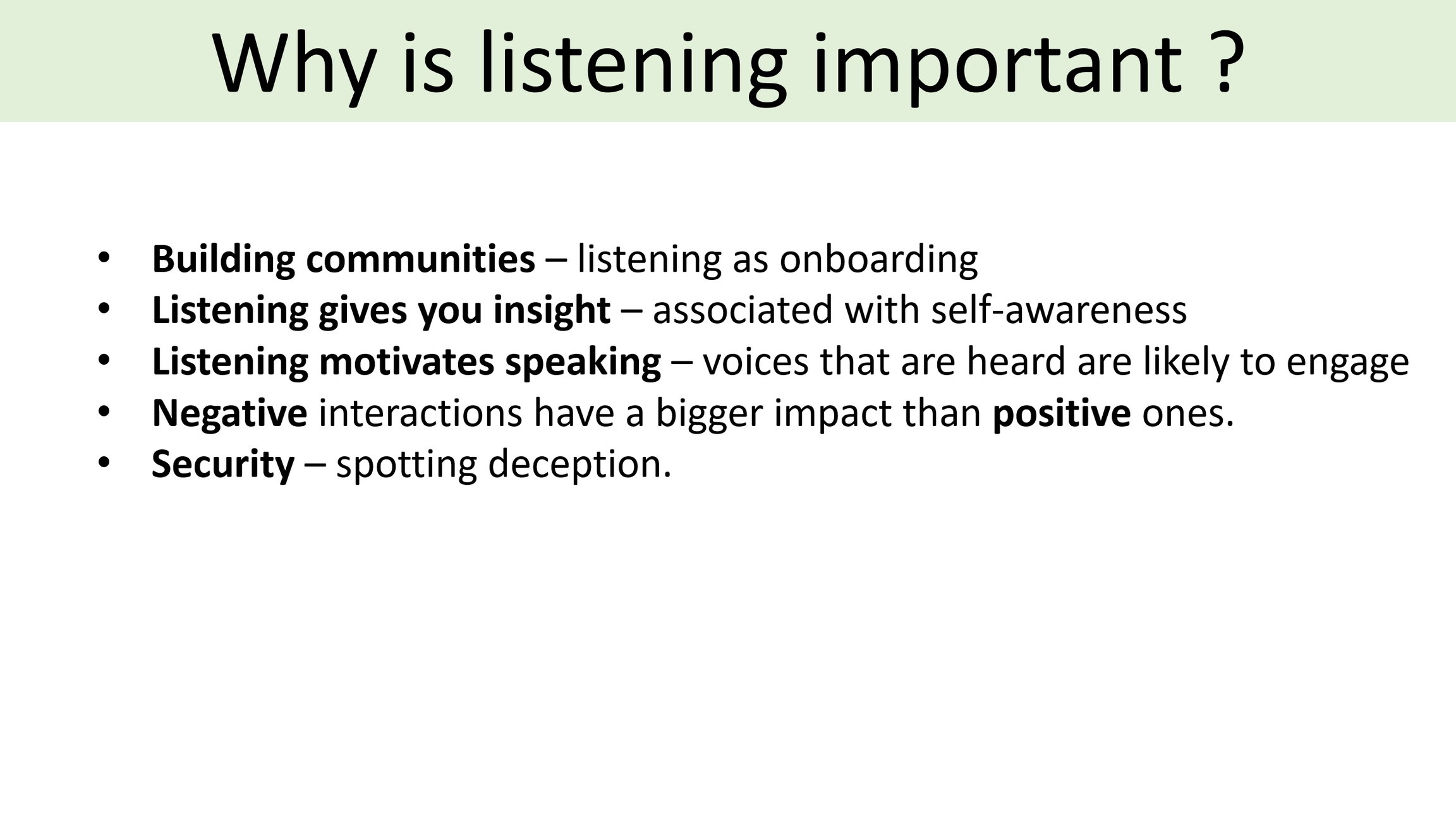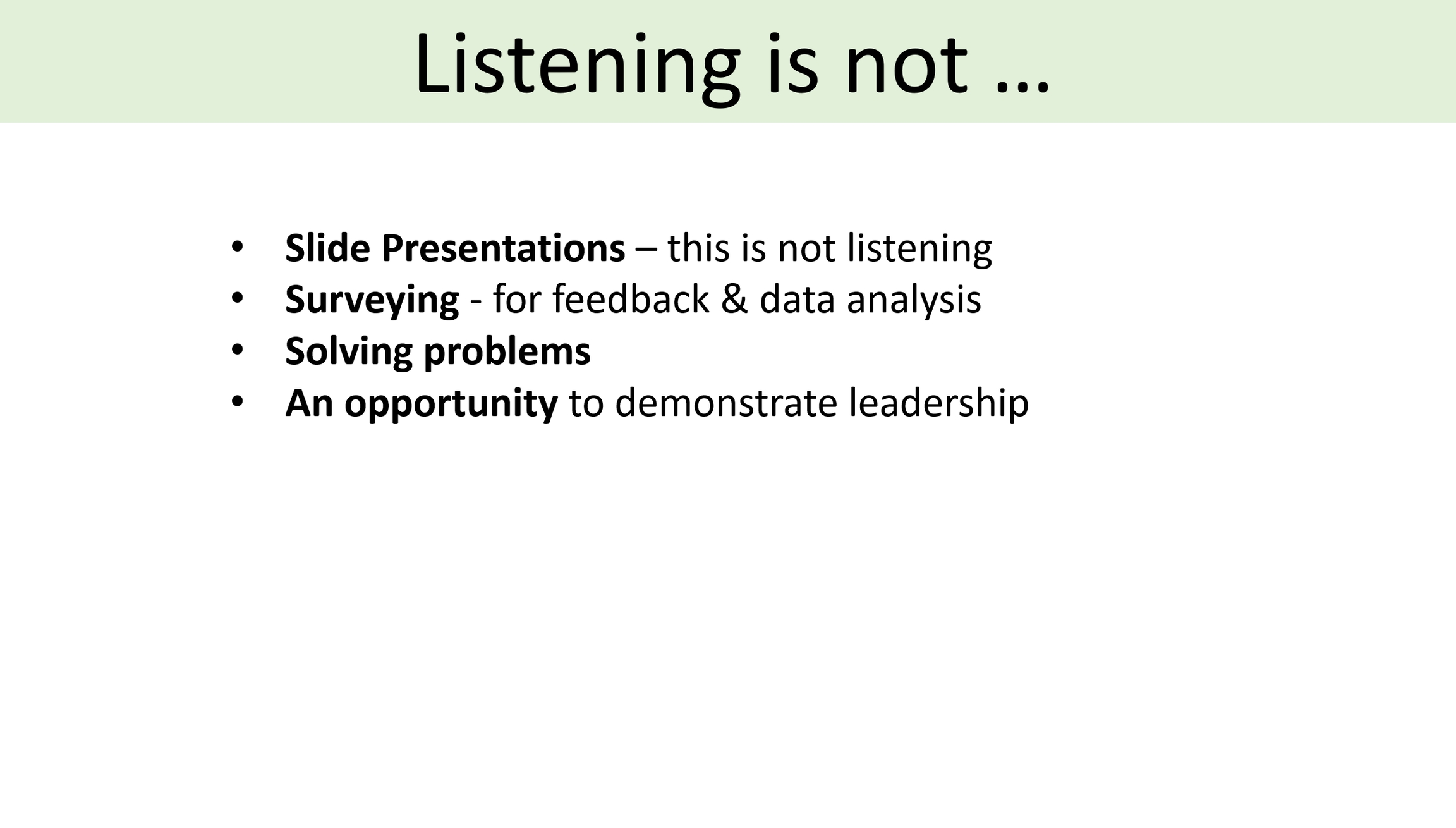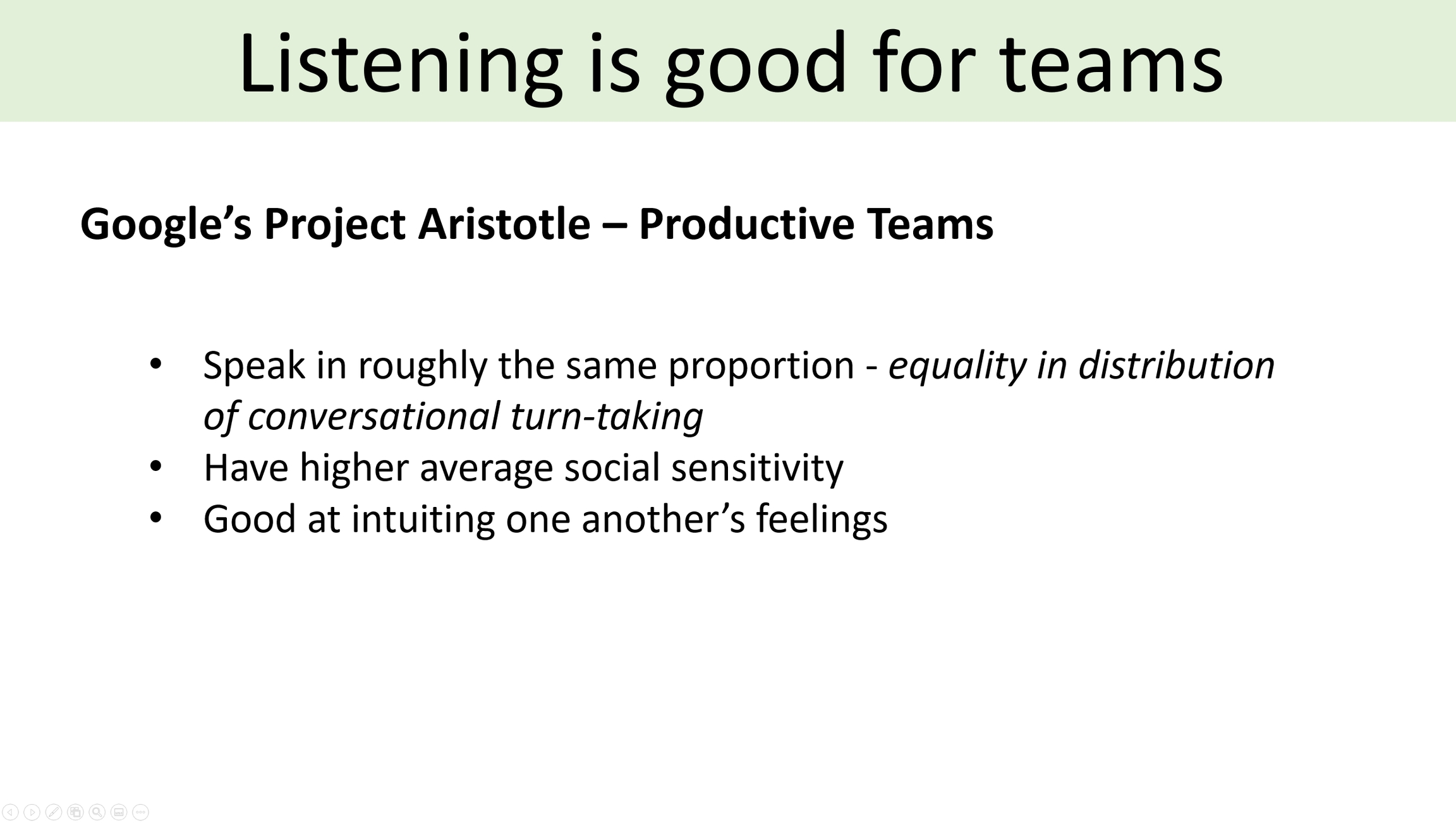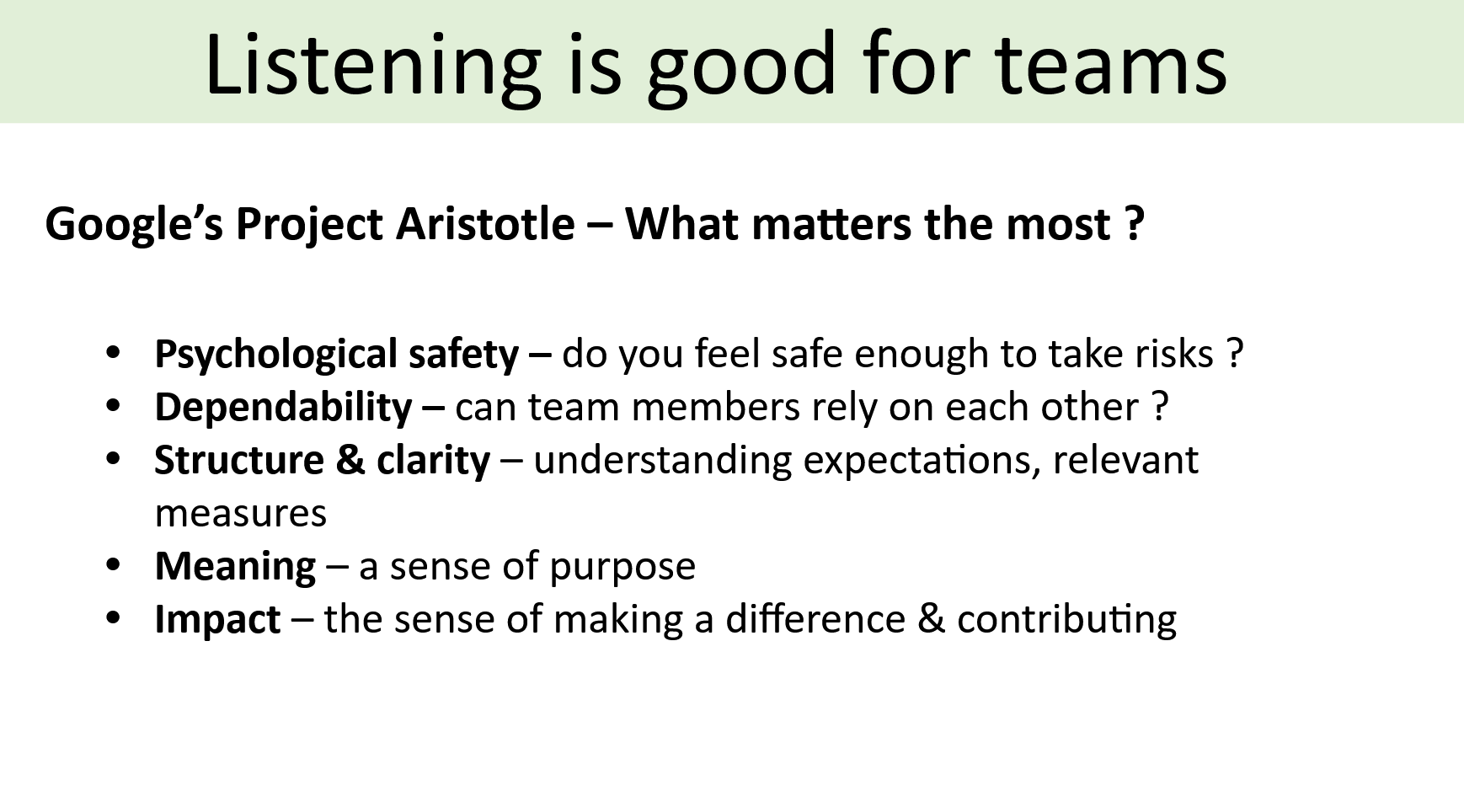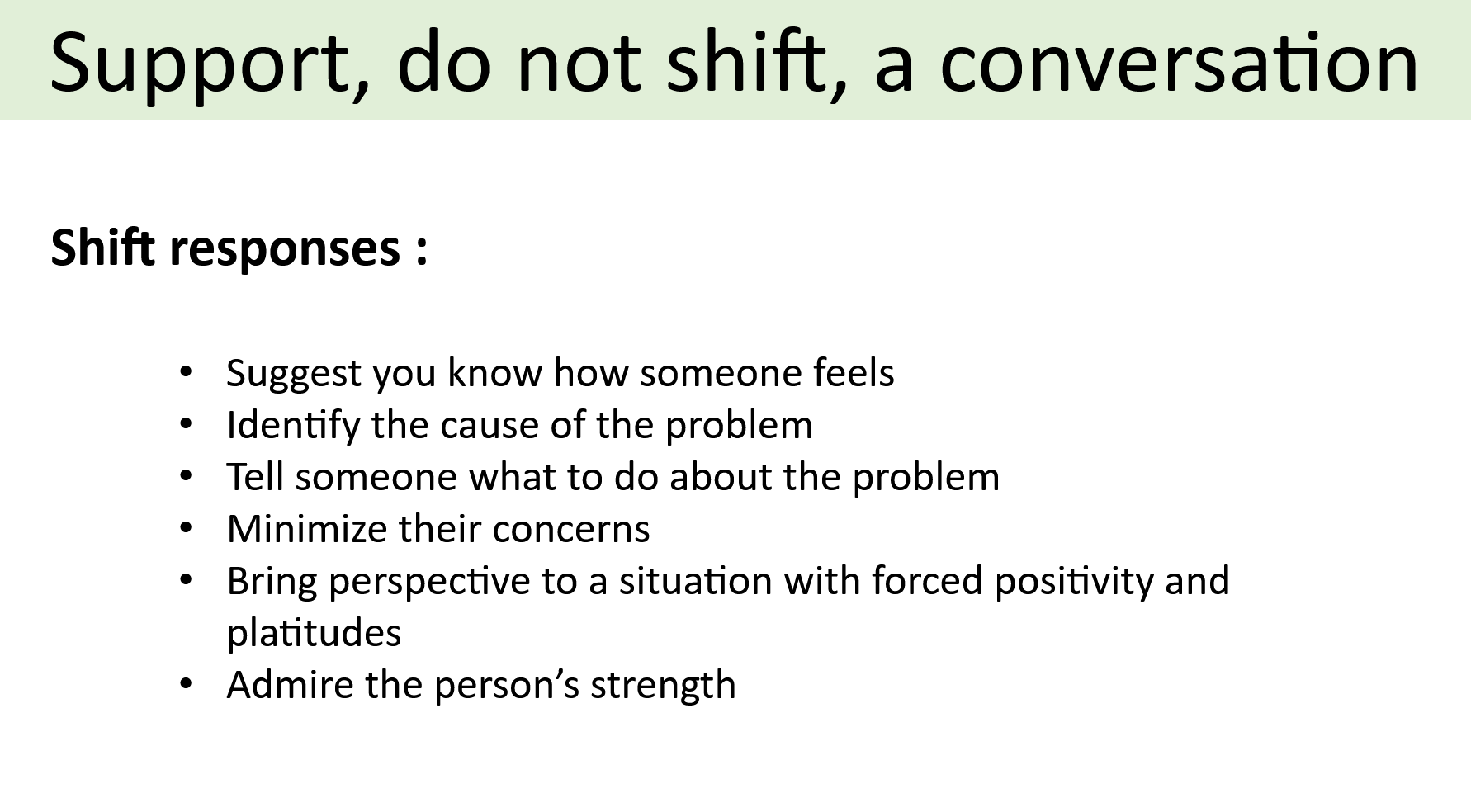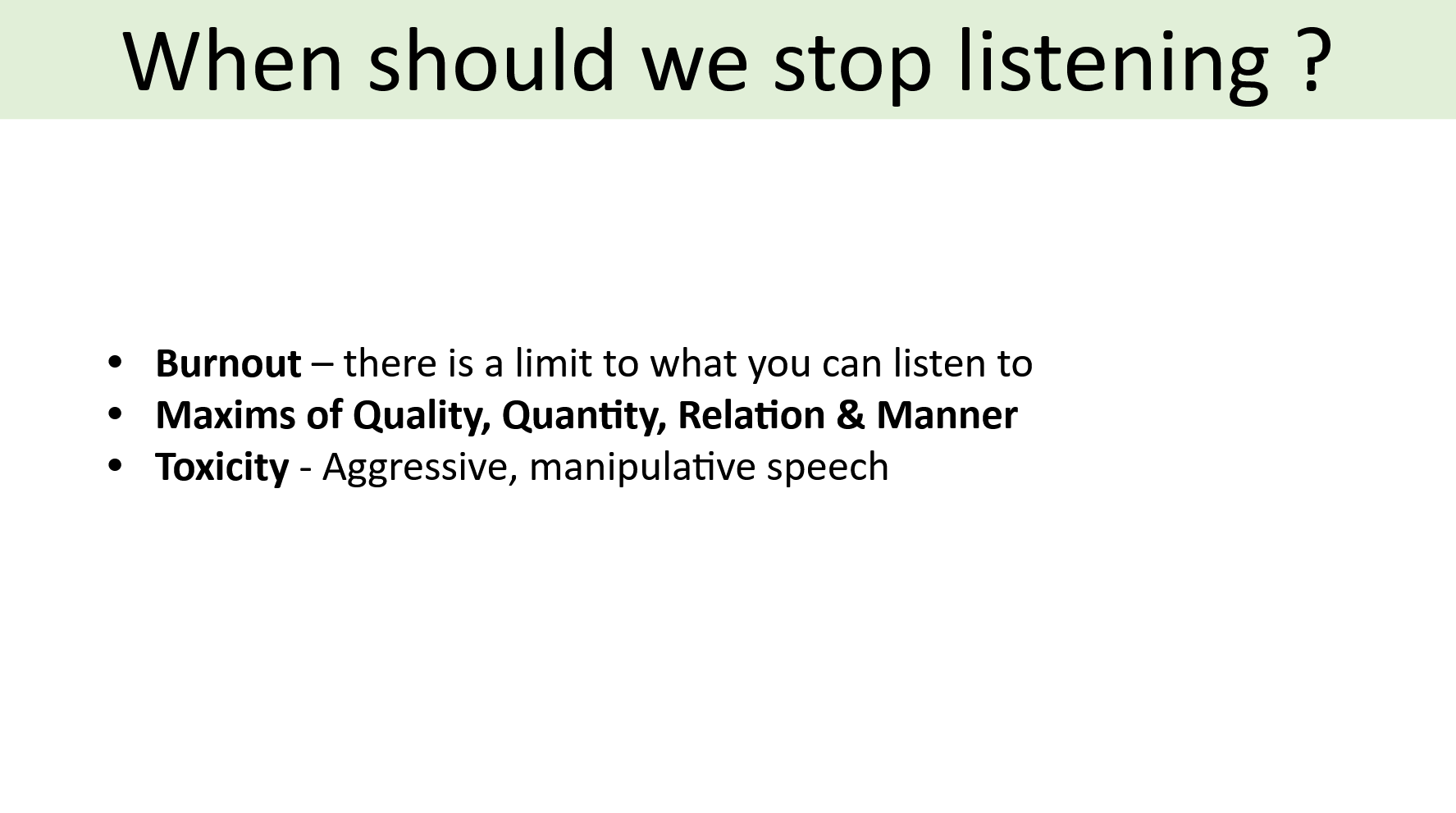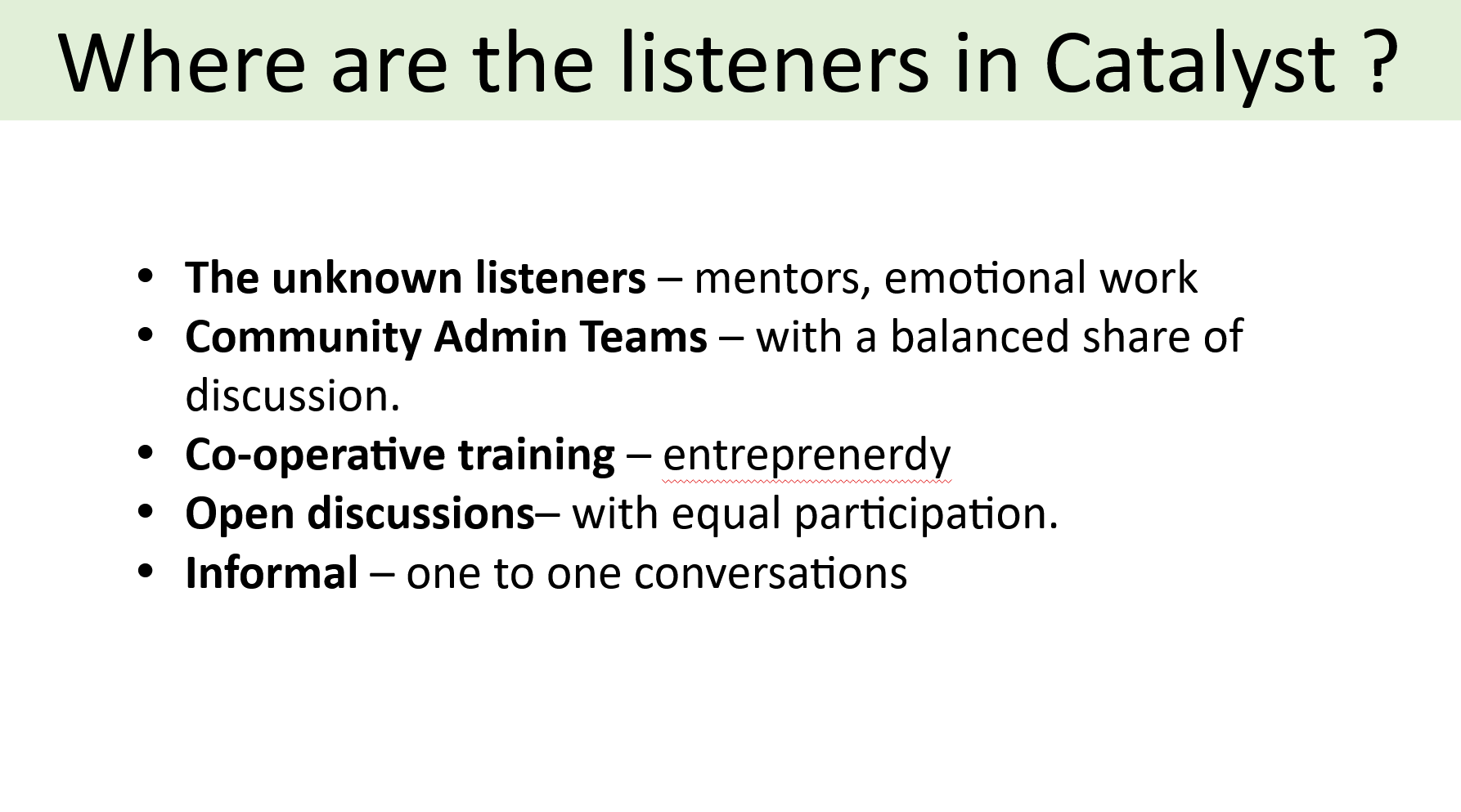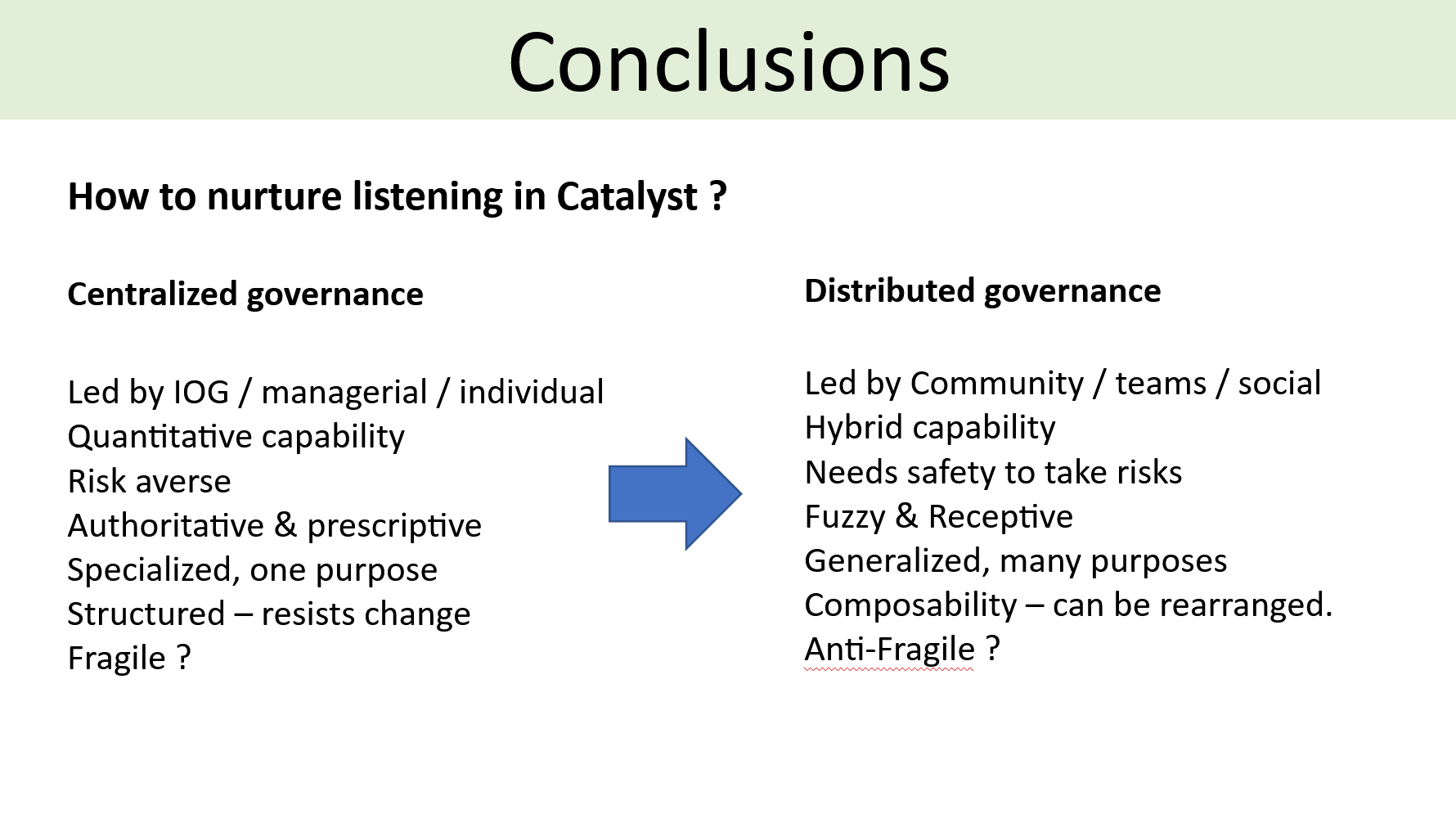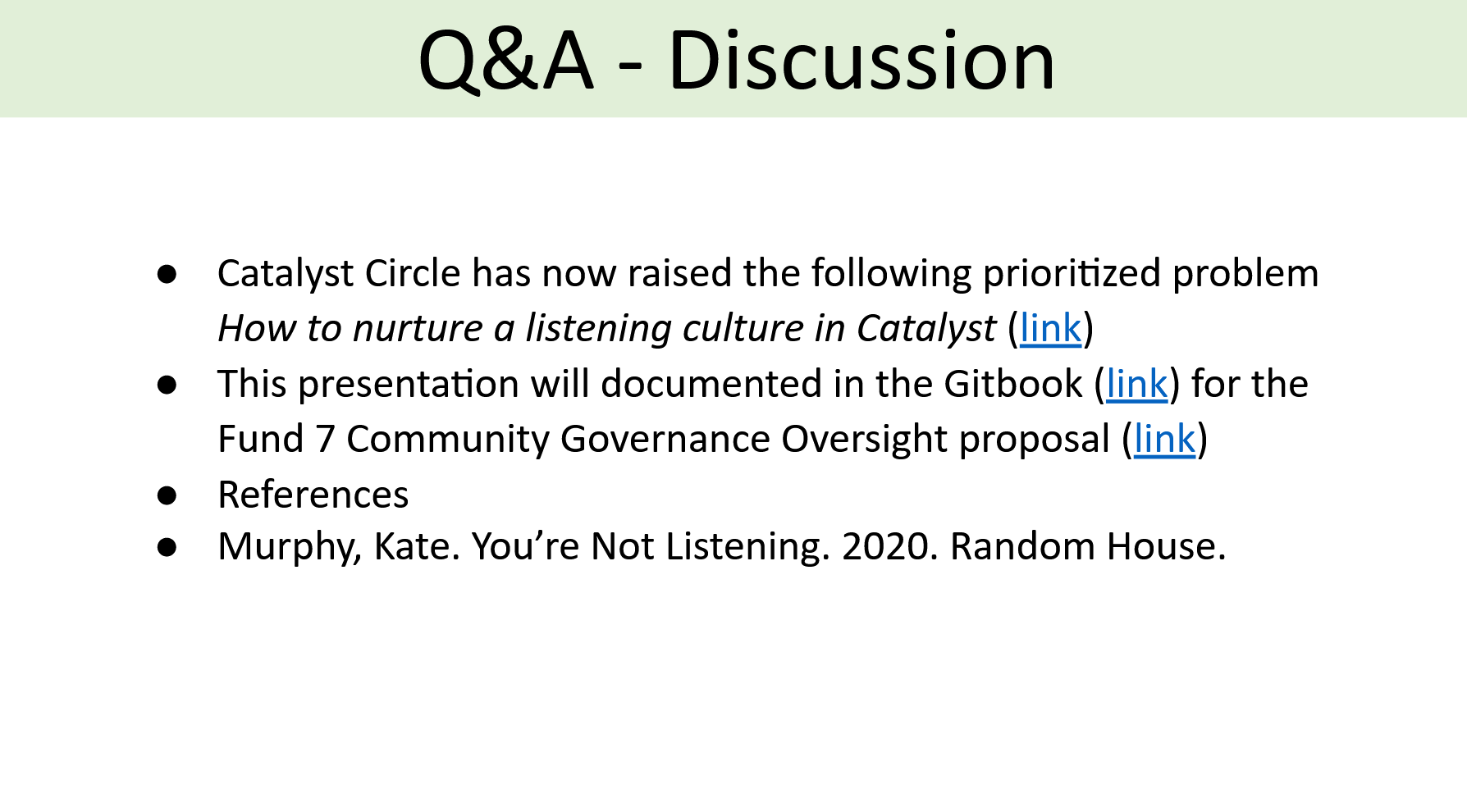How to nurture a listening culture in Catalyst ?
A Catalyst After Town Hall Presentation & Discussion. 12th January 2022 - Community Research
Recording
Slides & narration
How to nurture a listening culture in Catalyst
Stephen Whitenstall, QA-DAO****
I do not regard myself as an expert or even a good listener myself.
Interactions and experiences with different parts of the community and many conversations with different individuals have brought me here.
As governance issues come to the fore the importance of different voices being heard becomes critical and I now see it as a capability we should all nurture.
Why is Listening important ?
Building communities – listening as onboarding
We talk a lot about on-boarding in Catalyst, but what induces new people to stay ?
In part it is spaces where people listen to each other, provide acknowledgement and evaluative feedback. Where they feel they have crossed a threshold and feel at home.
Listening gives you insight
Good listeners are aware of themselves & who they are listening to. They have situational awareness.
Listening motivates speaking
Voices that feel they are heard will be more likely to engage and speak up. There is a double-bind here because this also implies that the voices you hear are the ones that have been listened to. Not the voices that struggle to be heard.
Negative interactions have a bigger impact than positive ones.
A single negative experience of not being listened has a disproportionately big impact on a person. Research has suggested it is up to 5 times as impactful as a single positive experience. You remember what hurts you.
Security - spotting deception.
Conman are good listeners. People who are not listening are easier to deceive and distract.
Listening is not …
Slide Presentations – this is not listening
Presentations, particularly long ones, is not listening. Of course slide decks are needed to inform and educate. But an excess of self-promotion, self-referential and qualifying information will prompt people to stop listening.
Listening is not … Surveying for feedback & data analysis
There is a culture of surveying in Catalyst which typically forms the basis for how we represent ourselves. But this information is always solicited and framed according to the concerns & priorities of the surveyor. If novel voices are to be heard then unsolicited feedback must be discovered.
Listening is not … Solving problems
The temptation to fix things prioritizes and foregrounds your own knowledge. Whereas actual listening is the wisdom to quieten your voice and risk hearing another voice.
Listening is not … An opportunity to demonstrate leadership
If you are focused on how you lead you are not really listening.
Project Aristotle – Productive Teams
In 2012 Google commissioned a study to find out what makes a good team. After three years of collecting data they found that the most productive teams have members who
•speak in roughly the same proportion - “equality in distribution of conversational turn-taking.”
•have a higher “average social sensitivity,” which means they were good at intuiting one another’s feelings based on things like tone of voice, facial expressions, and other nonverbal cues.
Project Aristotle - What matters the most ?
This research identified dynamics that contributed to interdependent teamwork.
What mattered the most was :
Psychological safety – do you feel safe enough to take risks ?
Teams who co-operate closely and can express themselves feel safe enough to take the risk of speaking and exposing the vulnerability of their perspective.
Dependability – can team members rely on each other ?
Team members support each other with contributions and can be relied on to complete work.
Structure & clarity – understanding expectations, relevant measures
Where teams listen to each they have a clear understanding of what is expected of them. Goals can then be set at an individual and group level. And any Key Performance Indicators will be relevant and attainable.
Meaning – a sense of purpose
There is space for a varied sense of purpose which often depends upon personal priorities & circumstances being heard. Not a centralised or homogenous message.
Impact – the sense of making a difference & contributing
Impact – the sense of making a difference & contributing to the organisation as a whole. Accessible user journeys that can direct people where they feel most valued.
Shift Responses :
Suggest you know how someone feels & identify the cause of the problem
Even if you empathize with how someone feels, to listen is to allow their feelings to be expressed not yours. They are unlikely to be seeking analysis from you and if you identify their problem you are taking it away from them.
Tell someone what to do about the problem
Being aware of someone’s problems does not mean you must fix it. The masculine fixit response is so common as to be a cliché. Even if you have good intentions your directions will likely be resisted & resented because you are taking over their problem & their persona.
Minimize their concerns
Minimizing people’s concerns is an even more explicit silencing of their voices.
Bring perspective to a situation with forced positivity and platitudes
A perspective that rests with a dominant voice has the freedom to push their own positive messages but that freedom is not granted to new voices. Novel perspectives can easily be treated as negative particularly if they critique the status quo. The world is not divided into right / wrong, positive / negative energies or light and dark – but is nuanced.
Admire the person’s strength
Try not to characterize someone’s emotional state. Though you have empathy, you do not know how they feel. Most people just want to be heard, to have a platform, a voice.
When should we stop listening ?
Burnout – there is a limit to what you can listen to
People who spend a lot of time listening, such as service workers, experience a limit to their listening capability. Attending to and engaging with others requires skill, emotional investment and patience. We are all human. And this can only be sustained so long.
Maxims of Quality, Quantity, Relation & Manner
As many Community Advisors & vCAs realize there are certain reasonable expectations when listening. Communication is co-operative. And if the quality of what you are hearing is suspect, the quantity overwhelms us too much, if what is said does not relate to what we are talking about or is nonsensical we become confused. And if the manner of what is said is over-long, all over the place or ambiguous we may become restless.
Toxicity - Aggressive, manipulative speech
Listening is a co-operative endeavour so if someone is being aggressive or trying to manipulate you then there is no obligation to listen.
Where are the listeners in Catalyst ?
Where have I encountered listeners in Catalyst ?
The unknown listeners
The largest cohort of listeners in Catalyst are the unknown listeners. They are ubiquitous. Everywhere where support is sought from individuals whose patience, availability and wisdom is recognized. They are some of the most highly skilled and hardest working people. And yet what they do is known the least known and rarely promoted as a capability.
Community Admin Teams
In a group setting listening can emerge as a culture of mutual support and respect. This is evident where participants are able to contribute and be heard equally in meetings and discussions.
Co-operative training
Entreprenerdy delivers it's training with short presentation followed by a discursive participation.
Open discussions – with equal participation
Where people take turns to speak and risk expressing their views.
Informal – one-to-one conversations
Conclusions
So how does listening relate to what we do in Catalyst ?
Nurturing a culture of listening will assist a shift from centralized to distributed governance.
From managerial and individual competencies to the communitarian & social capabilities of teams.
From a capability concerned with the quantitative to a hybrid capability that extends to qualitative skills.
From the risk adverse to building & nurturing the safety needed to take risks.
From specialized, singular purposes to generalised, multi-facted purposes.
From a rigid structure that resists change to composability that can respond to change and rearrange.
From the Fragile to the Anti-Fragile ?
References
Catalyst Circle Prioritized Problem
How to nurture a listening culture in Catalyst
Catalyst Circle has now raised the following prioritized problem : How to nurture a listening culture in Catalyst (link)
Fund 7 Community Governance Oversight proposal
Books
You’re Not Listening
Murphy, Kate. You’re Not Listening. 2020. Random House.
Research cited
Project Aristotle -
… what Google learned from its quest to build the perfect team … group dynamics, emotional intelligence and psychological safety
OKRs - “Objectives and Key Results”
Understand team effectiveness
“Data sets shed light only on what’s in the data set.”
Bit by Bit: Social Research in the Digital Age (Princeton, NJ: Princeton University Press, 2017).
The Nature and Correlates of Conversational Sensitivity
Maxims of Quality, Quantity, Relation & Manner
certain expectations in conversation H. Paul Grice, Studies in the Way of Words (Cambridge, MA: Harvard University Press, 1991
politeness and fairness in turn taking Geoffrey Leech, Principles of Pragmatics (New York: Routledge, 2016)
Conversational Narcissism & the Shift/Support Response
The Pursuit of Attention, Power and Ego in Everyday Life. Charles Derber.
Feedback in Zoom Chat
John Wellesz : great quote from Maya Angelou: “I've learned that people will forget what you said, people will forget what you did, but people will never forget how you made them feel.”
Allison Fromm : Great quote
Dor Garbash : Damn I haven’t been listening for quite a while…
Stephen Lockhart : Here’s another thought I’ve held on to over the years: “Shared pain is lessened, shared joy is increased, thus do we refute entropy”
John Wellesz : nice
Jack Briggs : Great presentation and content Stephen
Stephen Lockhart : 🙏 thank you Stephen for thinking deeply about this
Stephen Whitenstall : Thanks Stephen
Stephen Whitenstall : I will add notes and feedback here afterwards - https://quality-assurance-dao.gitbook.io/community-governance-oversight/
Jonathan Adjei : Brill .. ta!
Cauê Chianca : Tks for the slides, Stephen
John Wellesz : an interesting thing I've found: the opposite of being judgmental is being curious
Allison Fromm : Well said
Zoé Kleist : preach it Harry!! love it! awareness about culture and individuals and their relation is so important!
Zoé Kleist : also love that cardano has this as a value :)
Andrii Voloshyn : But what is this toxicity everybody speaks about? Today I read hundreds of messages in Community advisors channel and didn’t notice anything special. They were probably removed?
Stephen Lockhart : Or perceived power
Stephen Lockhart : Not all perceived power is real.
Allison Fromm : @Andrii my experience has been the same as yours.
John Wellesz : A good way to startle a toxic person is to ask something like: "What was your intent in saying that?"
James Meidinger : some are aggressive due to a underlying fear and it then is relatedinto their tone and how they speak to others
Dan SecretDecks : @John they most likely cant or wont give the subconscious intent
harry hellyer : @ John - a very powerful question, I feel as it opens up alignment and awareness of other
John Wellesz : @Dan no but this is an hypnotic trick that will "shock" them and destabilize them. You don't care about their reply
Andrii Voloshyn : @Alison, now just it feels I missed something important
Zoé Kleist : preach it James!!
James Dunseith : The “safety” of just being an anony
James Dunseith : Anonymous troll
harry hellyer : Hey wonderful peeps, have to drop off now, very valuable session, have a great week all. H
James Dunseith : You too Harry
Jonathan Adjei : Cheers Harry!
Zoé Kleist : see ya Harry!! :))
Matthias Sieber : Thanks Harry.
Stephen Whitenstall : Thanks Harry
Zoé Kleist : if you want to be maximally incusive, you have to listen :)
Zoé Kleist : *inclusive ofc^^
Allison Fromm : Good point, Zoé
Zoé Kleist : thank you allison. no one can ever imagine all the realities that exist in the world. so we Need to stay open minded :)
Allison Fromm : 👍
Matthias Sieber : Streamlined and concise communication is a communication style. Some more narrative communication styles favor stolytelling.
Stephen Lockhart : Thanks everyone, gotta go!!
Johnny Nguyen : listening -> leads to someone feeling like they are being heard -> someone feeling like they are being heard leads to connection -> connection leads to limbic resonance. :)
J P : But we also need inlets for people to coordinate and have a spokesperson. Not all want to engage in the discussion outside of their own safe space
Jonathan Adjei : Cheers Stephen L .. !
John Wellesz : meditation is probably a good way, because to be able to listen to others you first need to be able to listen to yourself
Dan SecretDecks : lol john, iw as just writing down on my notes : listening by quieting the mind; maybe meditation as "listening practice"
James Meidinger : meditation is key have been doing that for a few years now, it has changed my life
Mike Dietrich : thanks Allison! :)
Matthias Sieber : Thanks for sharing, Allison.
Zoé Kleist : @john: i am convinced you can learn both at the same time :) and the understandings from both practices will influence each other.
Dor Garbash : I have to go. Learned a lot and curious to see how things move forward from here. Thanks everyone!
Jonathan Adjei : Cheers Dor!
Zoé Kleist : bye dor! ^.^
Dan SecretDecks : Bye Dor, see you soon!
John Wellesz : thanks to Charles Hoskinson's AMAs, I've started meditation with the Calm app and the 30 days course named "how to meditate" is really awesome
James Meidinger : nice john it will serve you well
Matthias Sieber : I acknowledge, I'm stepping into my male behavior here, but I want to share this book recommendation (primarily for my cisgender males). Gender through the prism of difference by Maxine Baca Zinn, Pierrette Hondagneu-Sotelo, Michael A. Messner, and Amy M. Denissen.
Zoé Kleist : to be able to listen you have to create a space where you can hear… ('hear' in a broader sense, it could also be reading^^)
Dan SecretDecks : thx Matthias!
Dan SecretDecks : Zoe fits well with the SecretDecks claim: Read Thy Self ^^
Zoé Kleist : the what? :)
Allison Fromm : I’ll get it...
Vanessa Cardui : https://quality-assurance-dao.gitbook.io/catalyst-circle-oversight-v2/meetings/meeting-5-january-6th-2022
Matthias Sieber : https://github.com/Catalyst-Circle/Catalyst-Prioritized-Problems/issues
Allison Fromm : Wow….you guys are fast!!
Dan SecretDecks : https://quality-assurance-dao.gitbook.io/catalyst-circle-oversight-v2/meetings/meeting-5-january-6th-2022#bullying-on-telegram-and-culture-of-listening-43-57
Dan SecretDecks : https://github.com/Catalyst-Circle/Catalyst-Prioritized-Problems/issues/62
Jonathan Adjei : https://quality-assurance-dao.gitbook.io/catalyst-circle-oversight-v2/meetings/meeting-5-january-6th-2022
J P : Community self moderation - calling out bullies
Matthias Sieber : sometimes calling them in
James Dunseith : How long do we have?
Johnny Nguyen : +1 Dan... Retreats + Nature + Reflection.
James Meidinger : selfless acts on discord, telegram and twitter, leaving personal opinions of a person or persons out of your comments
James Dunseith : http://restorativejustice.org/
Dan SecretDecks : Johnny: 100+
Zoé Kleist : yess!! :3
A W G : Fight club!
Kriss Baird : Guys, I hope I’ve been listening intently. Its given me a lot of food for thought. Those opportunities for reflection are so important. 🕊 I have to drop off now unfortunately - thanks for the openness Stephen and for everyone being open to vulnerability here. Not an easy thing to do in 2D. Take care everyone.
Allison Fromm : @AWG - The first Rule of Catalyst…..
Jonathan Adjei : Cheers Kriss!
Johnny Nguyen : Calcio Fiorentino
Dan SecretDecks : thanks Kriss and stay foxy!
A W G : 🤣
James Meidinger : first rule of catalyst lol
Zoé Kleist : you're SO WISE Felix!! your lessons are so important!
Dan SecretDecks : 100% @Felix
Conflict is necessary for growth, importantthat it happens in proper (restorative) environment
Dan SecretDecks : conflict transformation instead of - resolution
Matthias Sieber : you're speaking my language
James Meidinger : conflict is inevitable its how you respond to it that matters
Johnny Nguyen : Conflict is uncomfortable, but growth happens outside our comfort zones. :)
Zoé Kleist : what goes with listening is: asking good questions. and also providing a space. These are necessities, otherwise you cant evenhear.
Dan SecretDecks : we need more conflict in this room xD
John Wellesz : A useful mindset in dire situations is to always look for the positive aspect or discovery brought by that situation because there is always something positive about any situation that you can find if you look.
Johnny Nguyen : Thank you everyone. many positive affirmations and lovely reminders. I've got to step out for another call but I heart you all.
Jonathan Adjei : Cheers Johnny!
Dan SecretDecks : Bye Johnny and thanks for being!
Zoé Kleist : see ya Johnny :))
Patrik Suzzi : @ Matthias
My base culture taught me that I should avoid direct confrontation.
After living in northern Europe I learnt that is common and good to bring direct confrontation to the table
How should I learn to bring confrontation into the discussions?
James Dunseith : Gotta run!
James Dunseith : Thank you so much all
Matthias Sieber : @Patrik, a good starting point are organizations like Soliya and Erasmus for facilitation training.
https://soliya.net/
Patrik Suzzi : Thanks 🙂
Matthias Sieber : Prior to Catalyst Circle v1, there was someone who did some really great facilitation as well. I try to find out.
J P : Maybe we need some sort of flag system?
Allison Fromm : I have to drop off. Many thanks Stephen for bringing this topic to light and hosting this room! ♥️
Jonathan Adjei : Cheers Allison!
\
Last updated
